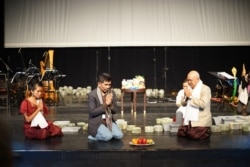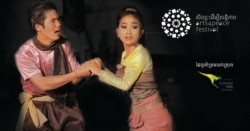Him Sophy comes from a family of classical musicians. The noted composer has Cambodian traditional music in his blood – his father played the roneat, a Cambodian xylophone, and his grandfather plucked at a three-string instrument called a tro-Khmer.
The famous composer is known for his fusion of Cambodian classical music with western, opera and rock music. It was these skills that helped create “Bangsokol: A Requiem for Cambodia”, his latest work that “is a multi-disciplinary stage production combining music, film, movement and voice,” according to a description online.
Audiences will be able to witness the unique blending of Him Sophy’s compositions and the visuals of prominent filmmaker Rithy Panh. The performance attempts to serve as an inspiration for post-conflict societies by showcasing the rejuvenation of the arts.
The composition picks up from Him Sophy’s personal experiences during the Khmer Rouge, when he was ripped from his family and made to do manual labor in Prey Veng province. When the Khmer Rouge took over Phnom Penh in 1975, Him Sophy was a 13-year-old studying the arts at the Royal University of Fine Arts.
“Early on we continued to study and practice playing, despite the ongoing fighting,” Him Sophy recalled. “Then under regime, the Khmer Rouge destroyed all forms of arts and music.”
After playing in the Unites States, Australia and France, “Bangsokol” will play for Cambodian audiences during the Arts4Peace festival that commences this week on November 14. The 10-day festival will celebrate three generations of artists and cultural workers who have attempted to revive traditional arts following the fall of the Khmer Rouge.
The festival is organized by Cambodia Living Arts, which is celebrating its 20th anniversary and has also worked to ensure Cambodian art forms were revived and allowed to transform.
“To build the future of Cambodia with stability, I think people need to understand the current and past history of the country, and the artists whom we will honor [at the festival] are the catalyst for such future,” So Phina, a program manager at Cambodia Living Arts.
The festival will take place at various locations in the city, including the Institute of Foreign Languages (IFL), the Cambodian-Japan Cooperation Center (CJCC), the Chaktomuk Theater and the Institut français du Cambodge, and will also feature exhibits and panel discussions.
Apart from “Bangsokol”, Him Sophy will feature another composition called “Where Elephants Weep,” an opera that mixes Western and Eastern sounds to narrate the story of a Cambodian-American rock producer who falls in love with a karaoke singer after returning to Cambodia.
The two features being showcased to Cambodian audiences marks the struggle artists, like Him Sophy, have undertaken to revive Cambodian art forms, often in the face of severe adversity.
After being made to work in the fields, Him Sophy was lucky to escape the wrath of the Khmer Rouge, which particularly targeted artists, performers, composers for not being “pure” Cambodians and who they considered were affected by Western influences.
“Although the Khmer Rouge killed most of them [artists], the artist’s blood remains in us. Those who survived worked very hard to restore everything from scratch,” he told VOA Khmer.
Him Sophy went on to be educated at the Moscow State Tchaikovsky Conservatory in Russia during the Soviet Union period, earning a master degree in music composition and PhD in musicology. Now based in Phnom Penh, the renowned composer finds appeal for his amalgamation of Cambodian classical music and performance art forms with global themes.
For Him Sophy, the chance to play his compositions at a major Phnom Penh-based arts festival shows that there is increasing support for the arts in Cambodia, even though it can be hard to make ends meet for many local independent artists.
“Arts is a part of the country’s own identity. I believe when arts flourish, so does the country’s socioeconomics,” said Him Sophy.









